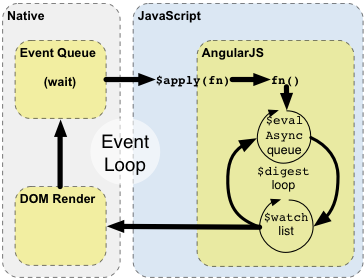AngularJS作用域变量设置不正确
我正在使用electron-json-storage,并且试图将AngularJS $scope变量设置为等于存储的数据。
下面是我的代码:
portal.controller('portalViewController', function($scope) {
//$scope.url = "http://www.google.com"; //correctly sets $scope.url to google.com
storage.get('portal_url', (err, data) => {
console.log(data.url); //prints out data as it should
$scope.url = data.url;
});
});
如您所见,我拥有这项工作的每个独立组件,但是当我将它们组合在一起时,$scope.url似乎没有被设置。我已经坚持了一段时间,无法弄清楚问题出在哪里。我对AngularJS还是很陌生,所以我可能真的很简单。
感谢您提供的任何帮助!
2 个答案:
答案 0 :(得分:2)
由于storage似乎是第三方插件,因此$scope中的任何更改都不会执行摘要周期。使用$timeout强制进行摘要循环,以便在UI中呈现更改。
portal.controller('portalViewController', function($scope, $timeout) {
storage.get('portal_url', (err, data) => {
console.log(data.url); //prints out data as it should
$timeout(function(){
$scope.url = data.url;
});
});
});
答案 1 :(得分:0)
如果回调确实来自AngularJS执行上下文之外的第三方来源,则可以简单地使用$apply:
portal.controller('portalViewController', function($scope) {
storage.get('portal_url', (err, data) => {
$scope.$apply(function() {
$scope.url = data.url;
});
});
});
从文档中:
AngularJS通过提供自己的事件处理循环来修改常规JavaScript流。这将JavaScript分为经典和AngularJS执行上下文。只有在AngularJS执行上下文中应用的操作才能受益于AngularJS数据绑定,异常处理,属性监视等。您还可以使用
$apply()从JavaScript进入AngularJS执行上下文。请记住,在大多数地方(控制器,服务)
$apply已由处理事件的指令为您调用。仅当实现自定义事件回调或使用第三方库回调时,才需要显式调用$apply。

— AngularJS Developer Guide - Integration with the browser event loop
将基于回调的API转换为基于AngularJS Promise的API
可以通过创建服务将基于回调的API集成到AngularJS框架中:
app.service("storageAPI", function($q) {
this.get = function(url) {
var deferred = $q.defer();
storage.get(url, (err, data) => {
if (err) {
deferred.reject(err);
} else {
deferred.resolve(data);
};
});
return deferred.promise;
};
});
用法:
app.controller('portalViewController', function($scope, storageAPI) {
storageAPI.get('portal_url')
.then(function(data) {
$scope.url = data.url;
}).catch(function(err) {
console.log(err);
});
});
此方法的优势在于,无需$apply($ q服务会自动执行此操作)即可将API集成到AngularJS框架中。此外,它还可以可靠地处理API中的错误。
有关更多信息,请参见 -AngularJS $q Service API Reference - The Deferred API。
- 我写了这段代码,但我无法理解我的错误
- 我无法从一个代码实例的列表中删除 None 值,但我可以在另一个实例中。为什么它适用于一个细分市场而不适用于另一个细分市场?
- 是否有可能使 loadstring 不可能等于打印?卢阿
- java中的random.expovariate()
- Appscript 通过会议在 Google 日历中发送电子邮件和创建活动
- 为什么我的 Onclick 箭头功能在 React 中不起作用?
- 在此代码中是否有使用“this”的替代方法?
- 在 SQL Server 和 PostgreSQL 上查询,我如何从第一个表获得第二个表的可视化
- 每千个数字得到
- 更新了城市边界 KML 文件的来源?